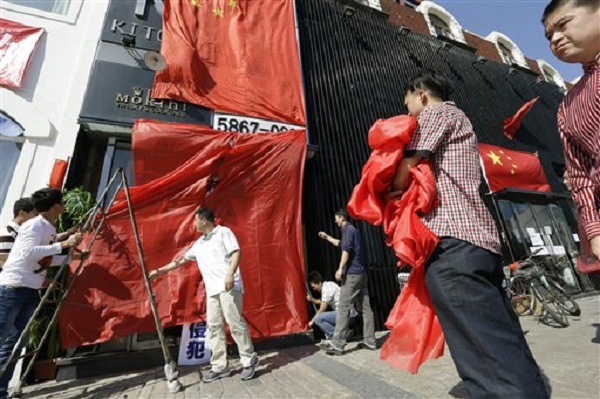Japan firms stop China operations after protests

Workers at a Japanese restaurant cover up the shop front with Chinese national flags and red clothes ahead of major protests expected on Tuesday in Beijing, China, Monday, Sept. 17, 2012. Japanese firms including Panasonic suspended operations at plants in China, companies and reports said Monday, after mass anti-Tokyo protests at the weekend over disputed islands in the East China Sea. AP/Ng Han Guan
BEIJING—Japanese firms including Panasonic suspended operations at plants in China, companies and reports said Monday, after mass anti-Tokyo protests at the weekend over disputed islands in the East China Sea.
Speaking in Tokyo, US Defense Secretary Leon Panetta called for diplomatic efforts to resolve the worsening spat, a day after warning “misjudgment on one side or the other could result in violence, and could result in conflict.”
China is Japan’s biggest trading partner and the stoppages came as the ruling Communist Party’s mouthpiece warned Japan’s economy could suffer for up to 20 years if Beijing chose to impose sanctions over the territorial row.
Trade sanctions between Asia’s two biggest economies could cast a pall over growth on the continent, which major Western countries are counting on to drive recovery from the global slowdown.
Panasonic said it was halting work at a factory in Qingdao in northeast China “for the time being” after a fire. The electronics giant had also reportedly temporarily suspended two other plants, but no immediate confirmation was available.
The camera and printer maker Canon, meanwhile, suspended three of its four main plants Monday and Tuesday to ensure the safety of its employees, a company spokesman told Dow Jones newswires.
Widespread anti-Japanese protests, some of them violent, have been held in recent days over a group of small islands known as Diaoyu in China and Senkaku in Japan. They are claimed by both but controlled by Tokyo.
The row intensified last week when the Japanese government bought three of the islands, effectively nationalizing them, and China responded by sending patrol ships into the waters around them.
China and Japan have close trade and business ties, with numerous Japanese companies investing in its larger neighbor and two-way trade totalling $342.9 billion last year, according to Chinese figures.
But the two countries’ political relationship is often tense due to the territorial dispute and Chinese resentment over past conflicts and atrocities.
A new wave of protests is expected Tuesday, the anniversary of the 1931 “Mukden incident” that led to Japan’s invasion of Manchuria, which is commemorated every year in China.
A commentary in the People’s Daily newspaper on the possibility of economic sanctions said: “Amidst a struggle that touches on territorial sovereignty, if Japan continues its provocations China will inevitably take on the fight.”
The Japanese economy has already experienced two lost decades from the 1990s and was suffering further weakness in the aftermath of the world financial crisis and 2011 earthquake, it added.
Japan in 2010 lost its title as the world’s second-biggest economy to China. “Japan’s economy lacks immunity to Chinese economic measures,” the state paper said – although it added that given the interdependency of the two, sanctions would be a “double-edged sword” for China.
The commentary – which only appeared in the paper’s overseas edition – said possible targets could include Japan’s manufacturing and financial industries, exports and investments in China.
“Strategic material imports” could also be affected, it said, an apparent reference to rare earth metals used in many high-tech products including iPads and iPhones.
“Would Japan rather lose another 10 years and even be ready to fall back 20 years?” it asked.
Shares of Chinese companies with business ties to Japanese firms fell in trading in Shanghai as investors sold on worries that the territorial dispute could hurt demand for their products.
Guangzhou Automobile Group, which has manufacturing joint-ventures with Japan’s Toyota and Honda, was down 7.13 percent in afternoon trading.
Dongfeng Automobile, controlled by a joint venture of Japan’s Nissan, fell 2.44 percent.